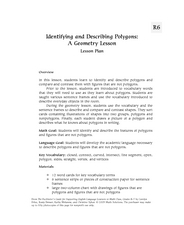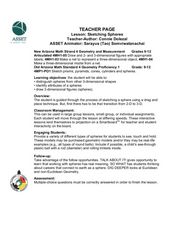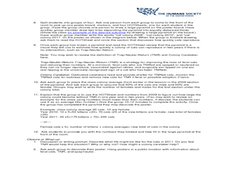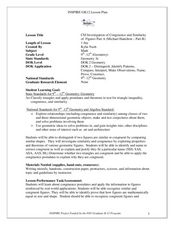Curated OER
Exploring Altitudes in Math
Students draw and calculate altitudes. They draw the altitude of acute, right and obtuse triangles and calculate the altitude of a triangle using the Pythagorean theorem.
Curated OER
Math: A Geometric Neighborhood
Learners, as a final project, draw a picture of their ideal neighborhood on a sunny day. In addition to the sun, their drawings include homes, trees, streets, and selected objects. Each object in their drawing has a written description...
Curated OER
Curriculum Compacting (Grade 3-5)
Fourth graders examine the use of curriculum compacting when learning math concepts. In this curriculum compacting lesson, 4th graders complete a math assessment before deciding on which compacting activities they will do to master the...
Curated OER
Proportional Similarities
Young scholars model the geometric relationship with graphing. In this geometry lesson, students differentiate between parallel, perpendicular, similar and congruent shapes. They use properties of polygons to differentiate their shapes...
Curated OER
Prime Numbers and Factors
Students determine factors of numbers to 100 and identify prime factors; students differentiate prime and composite numbers by the factors of the numbers.
Curated OER
Graphing Using Cookies
Pupils differentiate between bar graphs, line graphs, pictographs and bar graphs. After participating in a hands-on cookie activity, students label and draw their own graphs.
Curated OER
Standard Linear Form
Ninth graders identify and describe the x-intercept as the place where the line crosses the x-axis as it applies to football. They create their own differentiations to reinforce the distinction between the x-intercept and the...
Curated OER
Positive & Negative Space
Pupils review and differentiate between positive and negative space, view teacher sample, and cut out shapes to create puzzle-like picture in which one color of paper represents positive space and one color represents negative space.
Curated OER
Cones, Cylinders, Spheres
Students classify polygons by name and shape. In this geometry instructional activity, students identify the lateral surface of each conic. They differentiate between cones, cylinders and spheres.
Curated OER
Where Did We Go on Holiday This Year?
In this differentiated whole-group activity worksheet, learners list all the places they visited over the summer, record the places on a flip chart, calculate the distances on a road map and graph the data they collect.
Curated OER
Probability and Statistics
Learners reason mathematically as they solve problems dealing with probability of an even occurring. In this probability lesson plan, students differentiate between different rankings of candidates running for leadership. They identify...
Curated OER
Ara of Circles
Pupils identify the differentiate the different properties of circles and parallelograms. In this geometry lesson, students calculate the area of each solid and identify the formula. They relate Pi to the circumference of a circle.
Curated OER
Identifying and Describing Polygons
Young scholars identify the different properties of polygons. In this geometry lesson plan, students differentiate between polygons and non-polygons. They review important vocabulary to help them understand the properties of polygons.
Curated OER
Analyzing Body Angles
Students investigate angles of polygons. In this geometry lesson, students identify the relationship between angles and the number of sides in a polygon. They differentiate between sumilarity anf congruence in angles and sides.
Curated OER
Sketching Spheres
Students investigate spheres through sketches. In this geometry lesson, students sketch two and three dimensional shapes creating nets. They find and differentiate between the nets for prisms, pyramids, cones, cylinders and spheres.
Curated OER
Similar Triangles
Students differentiate between similar and congruent triangles. In this geometry lesson, students identify the missing side and angle of a triangle. They identify the different ratio and proportion of the sides of a triangle.
Curated OER
Fraction Comparison Study
Pupils use the computer to complete comparison of fraction problems. In this comparing fractions worksheet, students learn to use the terms greater than, less than, and equal to.
Alabama Learning Exchange
Meteor or Meteorite
Students differentiate between a meteor and meteorite. They participate in an experiment to discover how the size and weight of an object determines the size of the impact crater. They utilize their math skills by measuring with a ruler...
Curated OER
The Tale of the Feral - Care and Multiplication of Feral Cats
Students differentiate between a feral cat and a domesticated cat. In this cat lesson plan, students use the scientific method, calculate averages, solve story problems, and learn how a caretaker can help a feral colony live safely.
Curated OER
George and Sam Save for a Present
Third graders develop their algebraic thinking by recognizing a variety of patterns using concrete objects, numbers, tables, and pictures. In this George and Sam Save for a present lesson, 3rd graders communicate their mathematical...
Curated OER
Compass Designs
Young scholars investigate the properties of two and three dimensional objects. In this geometry lesson, students differentiate polygons based on similarity and congruence. They make observation and interpret the data.
Curated OER
CSI Investigation of Congruence and Similarity
Students differentiate between similarity and congruence using polygons. In this geometry lesson, students label triangles based on their properties. They find missing sides and angles using the interior sum theorem.
Curated OER
Mathematics in Robotics
Students build and create using math. For this geometry lesson, students differentiate between congruent and similarity as they observe polygons. They create robots with different functions using properties of geometry.
Curated OER
Leap Into Exponential Functions
Students use properties of exponents to solve equations. In this algebra lesson, students add, subtract, multiply and divide exponential functions. They graph and differentiate between exponential growth and decay.

























